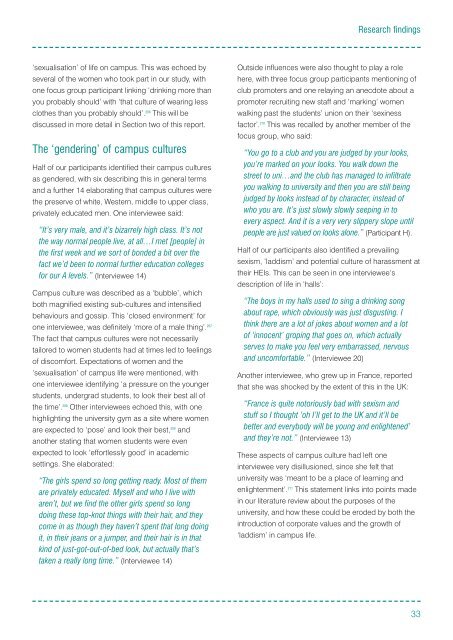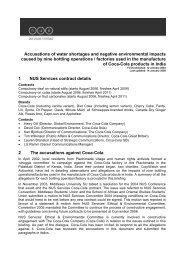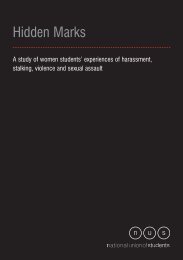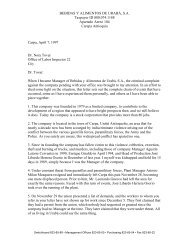'That's What She Said' report here. - National Union of Students
'That's What She Said' report here. - National Union of Students
'That's What She Said' report here. - National Union of Students
Create successful ePaper yourself
Turn your PDF publications into a flip-book with our unique Google optimized e-Paper software.
Research findings<br />
‘sexualisation’ <strong>of</strong> life on campus. This was echoed by<br />
several <strong>of</strong> the women who took part in our study, with<br />
one focus group participant linking ‘drinking more than<br />
you probably should’ with ‘that culture <strong>of</strong> wearing less<br />
clothes than you probably should’. 206 This will be<br />
discussed in more detail in Section two <strong>of</strong> this <strong>report</strong>.<br />
The ‘gendering’ <strong>of</strong> campus cultures<br />
Half <strong>of</strong> our participants identified their campus cultures<br />
as gendered, with six describing this in general terms<br />
and a further 14 elaborating that campus cultures were<br />
the preserve <strong>of</strong> white, Western, middle to upper class,<br />
privately educated men. One interviewee said:<br />
“It’s very male, and it’s bizarrely high class. It’s not<br />
the way normal people live, at all…I met [people] in<br />
the first week and we sort <strong>of</strong> bonded a bit over the<br />
fact we’d been to normal further education colleges<br />
for our A levels.” (Interviewee 14)<br />
Campus culture was described as a ‘bubble’, which<br />
both magnified existing sub-cultures and intensified<br />
behaviours and gossip. This ‘closed environment’ for<br />
one interviewee, was definitely ‘more <strong>of</strong> a male thing’. 207<br />
The fact that campus cultures were not necessarily<br />
tailored to women students had at times led to feelings<br />
<strong>of</strong> discomfort. Expectations <strong>of</strong> women and the<br />
‘sexualisation’ <strong>of</strong> campus life were mentioned, with<br />
one interviewee identifying ‘a pressure on the younger<br />
students, undergrad students, to look their best all <strong>of</strong><br />
the time’. 208 Other interviewees echoed this, with one<br />
highlighting the university gym as a site w<strong>here</strong> women<br />
are expected to ‘pose’ and look their best, 209 and<br />
another stating that women students were even<br />
expected to look ‘effortlessly good’ in academic<br />
settings. <strong>She</strong> elaborated:<br />
“The girls spend so long getting ready. Most <strong>of</strong> them<br />
are privately educated. Myself and who I live with<br />
aren’t, but we find the other girls spend so long<br />
doing these top-knot things with their hair, and they<br />
come in as though they haven’t spent that long doing<br />
it, in their jeans or a jumper, and their hair is in that<br />
kind <strong>of</strong> just-got-out-<strong>of</strong>-bed look, but actually that’s<br />
taken a really long time.” (Interviewee 14)<br />
Outside influences were also thought to play a role<br />
<strong>here</strong>, with three focus group participants mentioning <strong>of</strong><br />
club promoters and one relaying an anecdote about a<br />
promoter recruiting new staff and ‘marking’ women<br />
walking past the students’ union on their ‘sexiness<br />
factor’. 210 This was recalled by another member <strong>of</strong> the<br />
focus group, who said:<br />
“You go to a club and you are judged by your looks,<br />
you’re marked on your looks. You walk down the<br />
street to uni…and the club has managed to infiltrate<br />
you walking to university and then you are still being<br />
judged by looks instead <strong>of</strong> by character, instead <strong>of</strong><br />
who you are. It’s just slowly slowly seeping in to<br />
every aspect. And it is a very very slippery slope until<br />
people are just valued on looks alone.” (Participant H).<br />
Half <strong>of</strong> our participants also identified a prevailing<br />
sexism, ‘laddism’ and potential culture <strong>of</strong> harassment at<br />
their HEIs. This can be seen in one interviewee’s<br />
description <strong>of</strong> life in ‘halls’:<br />
“The boys in my halls used to sing a drinking song<br />
about rape, which obviously was just disgusting. I<br />
think t<strong>here</strong> are a lot <strong>of</strong> jokes about women and a lot<br />
<strong>of</strong> ‘innocent’ groping that goes on, which actually<br />
serves to make you feel very embarrassed, nervous<br />
and uncomfortable.” (Interviewee 20)<br />
Another interviewee, who grew up in France, <strong>report</strong>ed<br />
that she was shocked by the extent <strong>of</strong> this in the UK:<br />
“France is quite notoriously bad with sexism and<br />
stuff so I thought ‘oh I’ll get to the UK and it’ll be<br />
better and everybody will be young and enlightened’<br />
and they’re not.” (Interviewee 13)<br />
These aspects <strong>of</strong> campus culture had left one<br />
interviewee very disillusioned, since she felt that<br />
university was ‘meant to be a place <strong>of</strong> learning and<br />
enlightenment’. 211 This statement links into points made<br />
in our literature review about the purposes <strong>of</strong> the<br />
university, and how these could be eroded by both the<br />
introduction <strong>of</strong> corporate values and the growth <strong>of</strong><br />
‘laddism’ in campus life.<br />
33
















